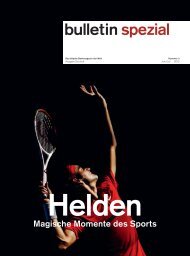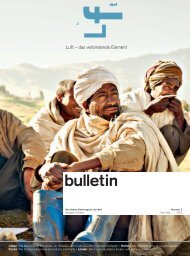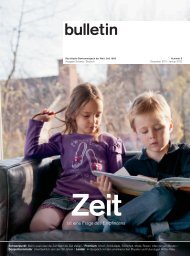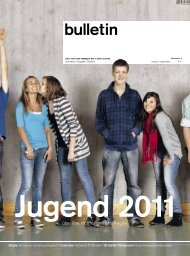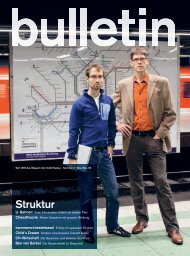Innovation
Global Investor Focus, 02/2007 Credit Suisse
Global Investor Focus, 02/2007
Credit Suisse
You also want an ePaper? Increase the reach of your titles
YUMPU automatically turns print PDFs into web optimized ePapers that Google loves.
GLOBAL INVESTOR FOCUS <strong>Innovation</strong> — 15<br />
Niche products rather than the mass market: Chris Anderson, editor-in-chief of “Wired” magazine and best-selling author<br />
explains the business of the future. Interview Steven Soranno, Credit Suisse Research Team<br />
“The YouTube effect<br />
is a wake-up call to the<br />
mass market.”<br />
Steven Soranno: <strong>Innovation</strong> is commonly<br />
believed to involve a high degree of<br />
creativity and thinking outside the box.<br />
In that sense, it can be thought of as<br />
more of an art than a science.<br />
What does innovation mean to you?<br />
Chris Anderson: <strong>Innovation</strong> is advancing<br />
the ball. It is evolving or creating<br />
something that did not exist before.<br />
<strong>Innovation</strong> typically works through the<br />
process of cross-fertilization. Newton<br />
said: “If I have seen further, it is by<br />
standing on the shoulders of giants.” It is<br />
now far easier to stand on the shoulders<br />
of other people’s ideas, other people’s<br />
work, other people’s contributions, and<br />
advance the ball. I think there has never<br />
Chris Anderson has been editor-in-chief of “Wired”<br />
magazine since 2001. A student of physics, he<br />
worked for the leading scientific journals “Science”<br />
and “Nature.” Thereafter, he was an editor for business<br />
magazine “The Economist” for seven years,<br />
based in London, Hong Kong and New York, covering<br />
the US economy, technology and other topics.<br />
been a better laboratory for cross-fertilization<br />
than the Internet.<br />
Is the impact of digitization on the global<br />
economic structure historically unique?<br />
Chris Anderson: Digitization is a stepchange<br />
in the economics of replication<br />
and distribution. We have seen other such<br />
changes in the past, such as Gutenberg’s<br />
press, but there has never been anything<br />
that has dropped the cost of replication<br />
and distribution as rapidly and as low as<br />
digitization. And what that does is make<br />
information, broadly defined, a costless<br />
economy, which is to say that it has near<br />
zero marginal cost. When things have near<br />
zero marginal cost, it completely changes<br />
the game. As a result, we now have<br />
essentially unlimited access to information.<br />
Now obviously, without the likes of Google,<br />
it would not be as useful as it could be.<br />
So, making sense of information is still a<br />
scarcity in the marketplace, but the access<br />
to information itself is increasingly becoming<br />
ubiquitous and free. And that is<br />
the environment in which innovation and<br />
cross-fertilization can happen.<br />
On the surface, your “Long Tail” thesis and<br />
C. K. Prahalad’s “Bottom of the Pyramid”<br />
appear similar. Both stating, with a broad<br />
stroke, that new technologies are one<br />
factor helping unlock the innovative and<br />
entrepreneurial spirits of millions of economic<br />
value niches, generating new<br />
economic paradigms that have far greater<br />
productivity curves than would be<br />
achievable under the industrial revolution,<br />
mass-market paradigm. How would<br />
one compare both theories?<br />
Chris Anderson: I went to India for a<br />
week to do just that. Basically, the difference<br />
between the two is that the Bottom<br />
of the Pyramid is about commodification –<br />
taking a small amount of products and<br />
making them very cheap – while the Long<br />
Tail is about “nicheification,” which involves<br />
changing the economics of the marketplace<br />
so you can offer a large number of<br />
products to satisfy minority tastes. Both




